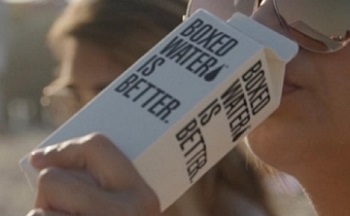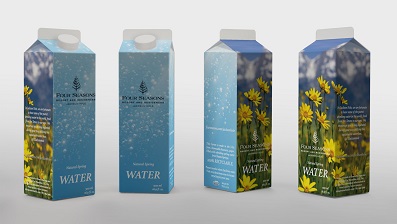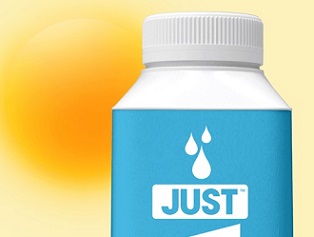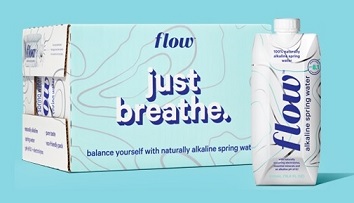
NATIONAL REPORT—With all the attention given to plastic straws, stirrer sticks and cutlery over the past year, not enough attention has been given to plastic water bottle alternatives. Green Lodging News has reported on water filtration systems and glass bottle delivery of that water within the hotel. That approach is a great idea but can make only a tiny dent in the overall plastic bottle waste problem. According to Rob Koenen, Chief Marketing Officer for Boxed Water Is Better®, 69 billion bottles are created each year and 38 billion of them go into oceans and landfills. Up to 90 percent of the 69 billion are not recycled. A plastic bottle in the ocean will take 700 years to decompose. At least four companies—Boxed Water Is Better, Waterbox LLC, Flow Water Inc., and JUST—offer more sustainably packaged alternatives to the plastic bottle.
Based in Holland, Mich., Boxed Water Is Better has plants in Michigan and Utah. “We hope to build another plant on the East Coast,” Koenen says. Boxed Water Is Better is packaged in a 100 percent recyclable paper carton that includes 75 percent renewable raw materials. The Boxed Water Is Better carton includes a thin layer of low-density plastic and some aluminum to make the water shelf stable. Competitors use a similar layer approach to make the water shelf-stable. By weight, the Boxed Water Is Better carton includes 90 percent less plastic than a plastic water bottle.
Similarly, Waterbox LLC also produces water in a 100 percent recyclable paper carton. That Northern California company packages its emersa WaterBox locally. It has plans to add two additional plants on the East Coast to

keep up with demand. Flow Water’s “packs” are mostly made from paper and designed to have a low carbon footprint. The packs are 100 percent recyclable and include 68 percent renewable materials. The cap is plant based.
One Bottle Brand Can be Reused
The 100 percent recyclable JUST water bottle is 54 percent made from paper and 28 percent from plant-based plastic. The plastic in the shoulder and cap of the JUST water bottle is made mostly from sugarcane. “We’re proud to say the materials and processes used for making our package result in 74 percent less harmful emissions, primarily CO2, compared to a standard heavyweight PET plastic bottle,” the company says. JUST water bottles can be reused.
An important green upside to using paper for packaging is that one can plant more trees. Oil is not renewable. Due to the extraordinary amount of energy used to blow-mold plastic, plastic bottles impact ozone depletion 190 percent more than cartons. They also contribute at least 30 percent more to smog, and global warming. Shipping is also important to consider. “We ship our boxes flat on pallets,” Koenen says. Boxed Water Is Better boxes are then assembled where the water is sourced—at the company’s two plants. It would take 26 trucks to transport what Boxed Water Is Better can accomplish with one truck.
Similar to Boxed Water Is Better cartons, JUST water bottles can be shipped flat. The company states, “This way we can ship 1.5 million of bottles in a truck, which requires fewer trucks and in turn, less energy. Shipping the same number of fully-formed plastic bottles would take 13 trucks.”

Good Taste Inside
Just as important as the packaging is what comes inside. According to WaterBox LLC, it sources its water from the “Shasta Springs” in Dunsmuir, Calif. The company says, “Mt. Shasta soars to an altitude of 14,162 feet, covered with eternal snow, and self-replenishing glaciers. These glaciers melt from the bottom and send our water on a long journey slowly percolating through miles of layered granite, gem infused rock, gold and green jade. The water surfaces (or ‘springs’), from the stone cracks in energetic streams into a series of caves, elevation 3000 feet.”
Koenen says the water Boxed Water Is Better sells is pure water with nothing added that has gone through eight steps to purify it and remove impurities and minerals. JUST water uses 100 percent spring water from the Glens Falls watershed in New York. It is gently filtered using UV light and ozone to purify it. According to Flow Water, which offers its water in six flavors, its water includes “more healthy minerals than most bottled waters” and is naturally alkaline. “That means our minerals come from the earth, not an artificial process,” the company says. “That also means Flow’s naturally occurring magnesium, calcium, bicarbonate, and potassium are super hydrating and balancing for your body.”
Koenen says 70 percent of America has the machinery to break up cartons for recycling. That will soon hit 90 percent in the next couple of years. (To see if your community recycles cartons, click here.) Plastic bottle recycling hit a roadblock in early 2018 when China announced it would stop taking most of America’s recyclables.
Consider Cost, Customization Options

In addition to considering packaging and the actual water when considering an alternative to water bottled in plastic, one should also consider cost. In some cases, there is some extra cost. “Well worth it,” one company spokesman said. In other cases, cost is comparable to bottled water.
The culture of the company selling the sustainably packaged water should also be considered. For example, Boxed Water Is Better has planted 790,000 trees in partnership with the National Forest Foundation in areas affected by deforestation and wildfires. The company’s goal is to hit 1 million trees this year. In June it will launch a plastic pledge month and ask water drinkers everywhere to give up plastic bottles for a month and hopefully for good. JUST converted an old church into its headquarters, Flow Water Inc. is a Certified B Corporation, and Waterbox LLC packages its water in a zero-emissions facility.
Both Waterbox LLC and Boxed Water Is Better offer packaging customization—something that can significantly help put a shine on a brand’s sustainability message.
Glenn Hasek can be reached at editor@greenlodgingnews.com.






The idea n the product is good ,practical for marketing(looks like Tetrapak…).But do not float false information about plastic(PET) water bottles.Used PET water/soft drinks bottles are regularly collected by the waste pickers(the informal sector) as a business n resource n traded in recycling facilities existing in countries like India,SouthAfrica,China,Japan,Malaysia,Phillipines ,Thailand etc (atleast 70 % collected for recycling).There is nothing wrong in suggesting “Alternatives, but do not campaign against :plastics which as group of materials are scientifically designed ,are environment friendly ,reusable,n recyclable,for safe n hygienic packaging of food ,in healthcare,including in recent Covid- 19.Indiscriminate littering of plastic waste on ground,riverside’s,even.in.ocean ,calls for behavioural change of the consumers(floating population/travelling passengers on ships).Plastic waste generated in cities/towns/shopping areas,must be managed with responsibility at all levels in the Society , by following Bin culture…O P Ratra….India